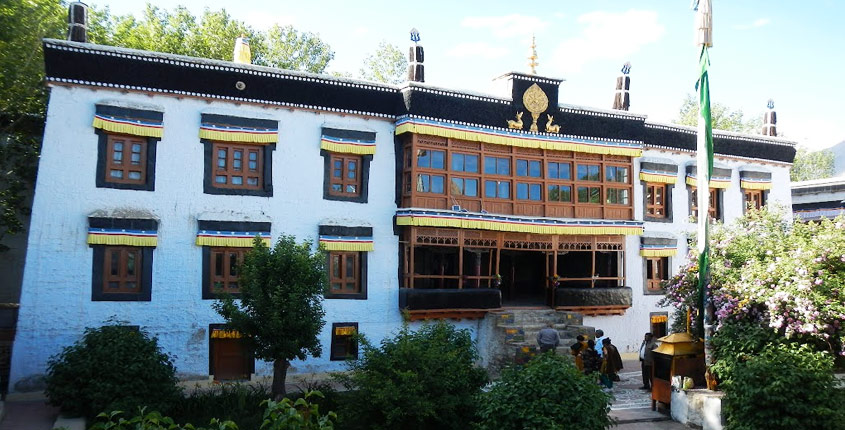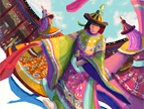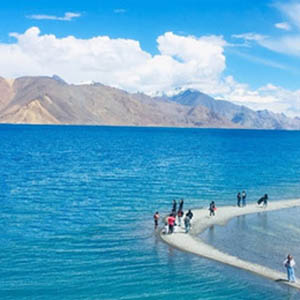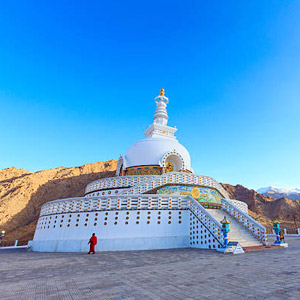
Sankar Monastery
![]()
Sankar Gompa, or monastery, is yet another beautiful monastery in Ladakh located at a distance of around 3km from the main town of Leh. You should visit this monastery during your tour to Ladakh, not just for its incredible architecture but also because it’s a treasure-trove of history and art. Sankar Monastery is believed to be a subsidiary of Spituk Monastery, with the same Lama presiding over it.
History/Legend
Sankar Monastery belongs to the Gelukpa sect of Buddhism while the head sect of Ladakh Kushok Bakul is the official resident of this Gompa. There are about 25 lamas of the Gelukpa sect attached to the Gompa, out of which, only a few are permanent residents. It’s believed that Sankar Monastery was built almost 90 years ago but stands on the site of a small temple built around 500 years ago.
What to see
The Sankar Monastery is home to various attractions that shed light on its history and heritage. The front balcony of the monastery is marked with 108 volumes of Buddha’s teachings along with three images of the Buddha – the Sakyamuni, the present and future Buddha. Upon entering the stone walls you will come across some incredible paintings of unknown gods which have been described as “guardians of four quarters of heaven”.
Inside the monastery, there is a vast hall with high ceilings known as Du Khang, while on the opposite side of the entrance is an imperial throne belonging to the chief Lama. One of the sights which will catch your attention here is the amazing sculpture made of barley and butter. Another sight which will leave you enchanted is the statue of Avalokitesvara with its 11 heads and 1,000 arms. One common theme found in all the idols, murals and sculptures is “protection”, which is also the main theme of the monastery. Inside the monastery, there is a doorway which leads to a chapel where you come across the image of Tsong-Kha-Pa, the founder of Gelukpa sect.
There is also a small outdoor area consisting of a Tibetan calendar along with other beautiful murals which depict the lifestyle of the lamas. A particular fascination in the outdoor area is the blue peacock mammoth statue which has 1,000 heads and 1,000 arms. The library offers incredible views of the Namgyal Tsemo Hill.
Best time to visit
March to October is the best time for visiting the Sankar Gompa. After the month of November though, all roads connecting Ladakh become inaccessible and close down due to heavy rainfall. From March to October, you will enjoy the climate of Ladakh and be able to explore its attractions without any hassles.
Timings of Sankar Monastery
Sankar Monastery is the residence of a few monks. As such, the visiting hours for the tourists is quite restricted. In the morning, you can visit the monastery from 7.00 AM to 10.00 AM and in the evening, from 5.00 PM to 7.00 PM.
Food availability
You won’t face any problem as far as food is concerned. Various kinds of Tibetan food are available at the monastery including momo, lamb cooked in red sauce, dry fruits and biscuits.
Nearby attractions
There are several attractions which lie in close proximity to Sankar Gompa. You should check out these attractions after exploring the monastery. Let us look at the nearby attractions to Sankar Monastery.
Leh Palace
Leh Palace, built in the 17th century, is one of the major attractions of Ladakh. A former royal palace of the Leh kingdom, it was one of the tallest buildings of its time with nine stories. The palace provides magnificent views of the Stok Kangri and Ladakh mountain ranges.
Namgyal Tsemo Monastery
Namgyal Tsemo Monastery, built in the 15th century by King Tashi Namgyal, is renowned for its three stories high solid gold idol of Maitreya Buddha. The monastery is a treasure-house of ancient manuscripts and wall paintings. The views of the surroundings are simply outstanding.
- Passes
- Lakes
- Monasteries
- Attractions
- How to Prepare for Ladakh Trip
- Facilities in Ladakh
- Climate
- Family Trip to Ladakh
- How and Where to Carry Spare Fuel
- Ladakh With Parents - Senior Citizens
- How to Carry Laptop
- ATM and Bank Facilities in Leh City
- Things to Carry for Ladakh Winter Trip
- Where & How to Rent an Oxygen Cylinder
- Ladakh in June
- Ladakh in May
- Ladakh in July
- Ladakh in September
- Ladakh in October
- Ladakh in August
- Ladakh in November
- Leh to Nubra Valley
- Delhi to Ladakh
- Bangalore to Ladakh
- Pangong Lake to Tso Moriri
- Travel from Manali to Leh
- Leh to Tso Moriri
- How to Travel to Pangong Tso
- How to Travel Nubra Valley to Pangong Tso via Wari
- Srinagar to Leh
- Leh to Khardung La
- Stay in Ladakh
- Rent a Bike in Ladakh
- Rent a Bike in Leh
- Rent a Bike in Srinagar
- Rent a Bike in Manali
- Mobile Phone Services in Ladakh
- Hotels on Manali Leh Highway
- Hotels on Srinagar Leh Highway
- Hotels Near Tso Moriri
- Hotels in Leh
- Hotels Near Pangong Lake
- Hotels in Nubra Valley
- Mountain Biking
- Leh Jeep Safari
- Adventure Sports
- Mountaineering in Ladakh
- Camping in Ladakh
- Lifestyle
- Buddhism in Ladakh
- Cuisine in Ladakh
- River Rafting in Ladakh
- History & Culture
- Shopping in Ladakh
- Trekking in Ladakh
- Wildlife in Ladakh
- Tips and Suggestions
- Ladakh in January
- Ladakh in December
- Clothes to carry for your Ladakh Trip
- Medical Facilities















